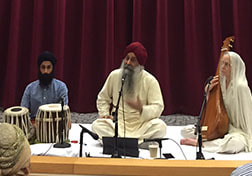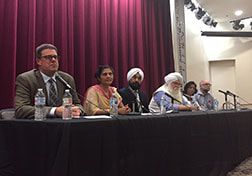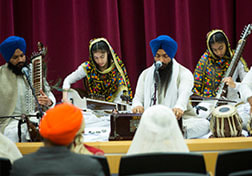
LOS ANGELES, CA - On November 10, the Sikh and Jain Professorship in the Theological Studies Department at Loyola Marymount University, with the support of the Sikh Community of Southern California and the Indian Consulate, held a one-day seminar at the LMU campus to commemorate the birth anniversary of the tenth Sikh Guru, Guru Gobind Singh and share his powerful and timely message “Recognize Humanity as One!”
(Manaas Ki Jaat Sabhe Ekai Pehchanabo.) Guru Gobind Singh lived in India during a time of socio-political oppression and forced religious conversion. He taught Sikhs to be fearless warrior-saints who stand against tyranny for truth, equality, justice and freedom of all religions, classes, races, and genders. Today, Guru Gobind Singh’s message is more timely than ever. Sikhs who wear turbans and grow beards as part of their faith, continue to be the targets of hate crimes. This conference allowed the American public to understand the Sikh identity.
The event brought together international speakers and musicians, the Sikh sangat as well as Sikh and non-Sikh students and professors from LMU and the surrounding UC schools to share in interfaith dialog to combat intolerance and promote understanding.
The day began with Gurbani Kirtan by Nanak Sadan Jatha who sang shabads of Guru Gobind Singh. Participants were given a warm welcome to the event by LMU’s Associate Dean Jonathan Rothchild who acknowledged the appropriateness of this event at LMU which, like the Sikhs, is dedicated to service and justice. Letters of support from congressional representatives Judy Chu and Brad Sherman were read by Nirinjan Singh Khalsa, Executive Director California Sikh Council.
Also the Sikh and Jain Studies Professor Khalsa hosted the event and shared her most recent research Sikh and Jain Coexistence: Young Gobind Rai in Patna Sahib illustrating how Guru Gobind Singh was born in a Jain guest house of the ancestors of Salis Rai Johri who is remembered in the Janamsakhis of Guru Nanak. It was this Salis Rai Johrisangat who gave the land for Sri Takht Harimandir Sahib to be built, now lying adjacent to the 500-700 year old Jain temple. During Khalsa’s talk two students Jessica Leu and Harman Deol shared their experiences learning about Sikhi in the Sikhism: Warrior Saints class. They spoke about learning the importance of sacrificing our selfish desires so that we may recognize our shared humanity to serve and care for one another with respect and dignity.
Bibiji Inderjit Kaur Khalsa, Ph.D., wife to the late Harbhajan Singh Khalsa Yogi and descendent of the great 19th century Commander Bhai Hari Singh Nalwa, shared the history of Guru Gobind Singh: Father of the Khalsa. Professor Ranjit Singh of Bhai Mardana Institute of Music, Los Angeles recited poems about DasamPita authored by one of his teachers GyaniGyan Singh “Almast”, a student of Vishnu Digambar Paluskar. Bhai Baldeep Singh, 13th generation exponent of Gurbani Kirtan, grandnephew of the late Bhai Gurcharan Singh and Bhai Avtar Singh, and founder of Anad Foundation, New Delhi offered A Poetic Remembrance of Sahib Sri Guru Gobind Singh Maharaj with beautiful lohri or lullaby poems he had himself composed. Nihal Singh, a UC Berkeley political science graduate presented a paper on Political Philosophy of Guru Gobind Singh and the American Tradition while Harleen Kaur, a sociology graduate student at UCLA offered that the Sarbat Khalsa consciousness can address issues of community, identity, and existence in the US diaspora. The day was rounded out by Dr. Kuldeep Singh, head granthi of Nanak Sadan Sikh Temple in North Hills sharing aspects of Guru Gobind Singh’s life and bani which encourage Sikhs to transform from Sparrow to Hawk: Combating Oppression with Love & Unity. Professor Pashaura Singh, Sikh Chair at UC Riverside delivered his thoughtful paper on Guru Gobind Singh’s Egalitarian Message and its Relevance in Modern Times.
The last session of the day was an interfaith panel allowing Catholics, Punjabi and non-Punjabi Sikhs, Jains, Muslims and Hindus to dialog on the conference themes “Recognize Humanity as One” and “Truth, Justice, Equality and Freedom.” The VP of Mission and Ministry at LMU, John Sebastian, moderated the interfaith panel addressing the shared warrior-saint spirit of the Sikhs with St. Ignatius of Loyola. During the interfaith panel Theological Studies Professors Amir Hussein and Mugdha Yeolekar shared the Muslim and Hindu perspectives of how we can live as one while honoring and appreciating our diverse approaches to faith, service and justice. Jain teacher Sushama Parekh offered the perspective of Oneness through the concept of the purified soul. Dean Manohar Singh of Humboldt State University and Nirinjan Singh Khalsa, Executive Director California Sikh Council shared the Sikh perspectives of Oneness through an appreciation of diversity, respect, and practical applications of these ideals. The successful one-day seminar in honor of Sahib Guru Gobind Singh Ji Maharaj concluded with outstanding and rare renditions of Gurbani Kirtan sung by Bhai Baldeep Singh with Nihal Singh on the jori and Nirvair Kaur on the taus.
The seminar was attended by a diverse group of Sikh and non-Sikh students, professors, and community members from around Southern California, who all participated to honor Guru Gobind Singh’s universal message “Recognize Humanity as One!”
A discordant note was struck when Khalsa invited Dr. Harvinder Sahota up to honor the Consul General of India, San Francisco, Venkatesan Ashok with a turban and was prevented in doing so because of a vociferous protest by a Sikh gentleman present.
The event brought together international speakers and musicians, the Sikh sangat as well as Sikh and non-Sikh students and professors from LMU and the surrounding UC schools to share in interfaith dialog to combat intolerance and promote understanding.
The day began with Gurbani Kirtan by Nanak Sadan Jatha who sang shabads of Guru Gobind Singh. Participants were given a warm welcome to the event by LMU’s Associate Dean Jonathan Rothchild who acknowledged the appropriateness of this event at LMU which, like the Sikhs, is dedicated to service and justice. Letters of support from congressional representatives Judy Chu and Brad Sherman were read by Nirinjan Singh Khalsa, Executive Director California Sikh Council.
Also the Sikh and Jain Studies Professor Khalsa hosted the event and shared her most recent research Sikh and Jain Coexistence: Young Gobind Rai in Patna Sahib illustrating how Guru Gobind Singh was born in a Jain guest house of the ancestors of Salis Rai Johri who is remembered in the Janamsakhis of Guru Nanak. It was this Salis Rai Johrisangat who gave the land for Sri Takht Harimandir Sahib to be built, now lying adjacent to the 500-700 year old Jain temple. During Khalsa’s talk two students Jessica Leu and Harman Deol shared their experiences learning about Sikhi in the Sikhism: Warrior Saints class. They spoke about learning the importance of sacrificing our selfish desires so that we may recognize our shared humanity to serve and care for one another with respect and dignity.
Bibiji Inderjit Kaur Khalsa, Ph.D., wife to the late Harbhajan Singh Khalsa Yogi and descendent of the great 19th century Commander Bhai Hari Singh Nalwa, shared the history of Guru Gobind Singh: Father of the Khalsa. Professor Ranjit Singh of Bhai Mardana Institute of Music, Los Angeles recited poems about DasamPita authored by one of his teachers GyaniGyan Singh “Almast”, a student of Vishnu Digambar Paluskar. Bhai Baldeep Singh, 13th generation exponent of Gurbani Kirtan, grandnephew of the late Bhai Gurcharan Singh and Bhai Avtar Singh, and founder of Anad Foundation, New Delhi offered A Poetic Remembrance of Sahib Sri Guru Gobind Singh Maharaj with beautiful lohri or lullaby poems he had himself composed. Nihal Singh, a UC Berkeley political science graduate presented a paper on Political Philosophy of Guru Gobind Singh and the American Tradition while Harleen Kaur, a sociology graduate student at UCLA offered that the Sarbat Khalsa consciousness can address issues of community, identity, and existence in the US diaspora. The day was rounded out by Dr. Kuldeep Singh, head granthi of Nanak Sadan Sikh Temple in North Hills sharing aspects of Guru Gobind Singh’s life and bani which encourage Sikhs to transform from Sparrow to Hawk: Combating Oppression with Love & Unity. Professor Pashaura Singh, Sikh Chair at UC Riverside delivered his thoughtful paper on Guru Gobind Singh’s Egalitarian Message and its Relevance in Modern Times.
The last session of the day was an interfaith panel allowing Catholics, Punjabi and non-Punjabi Sikhs, Jains, Muslims and Hindus to dialog on the conference themes “Recognize Humanity as One” and “Truth, Justice, Equality and Freedom.” The VP of Mission and Ministry at LMU, John Sebastian, moderated the interfaith panel addressing the shared warrior-saint spirit of the Sikhs with St. Ignatius of Loyola. During the interfaith panel Theological Studies Professors Amir Hussein and Mugdha Yeolekar shared the Muslim and Hindu perspectives of how we can live as one while honoring and appreciating our diverse approaches to faith, service and justice. Jain teacher Sushama Parekh offered the perspective of Oneness through the concept of the purified soul. Dean Manohar Singh of Humboldt State University and Nirinjan Singh Khalsa, Executive Director California Sikh Council shared the Sikh perspectives of Oneness through an appreciation of diversity, respect, and practical applications of these ideals. The successful one-day seminar in honor of Sahib Guru Gobind Singh Ji Maharaj concluded with outstanding and rare renditions of Gurbani Kirtan sung by Bhai Baldeep Singh with Nihal Singh on the jori and Nirvair Kaur on the taus.
The seminar was attended by a diverse group of Sikh and non-Sikh students, professors, and community members from around Southern California, who all participated to honor Guru Gobind Singh’s universal message “Recognize Humanity as One!”
A discordant note was struck when Khalsa invited Dr. Harvinder Sahota up to honor the Consul General of India, San Francisco, Venkatesan Ashok with a turban and was prevented in doing so because of a vociferous protest by a Sikh gentleman present.




 RSS Feed
RSS Feed
